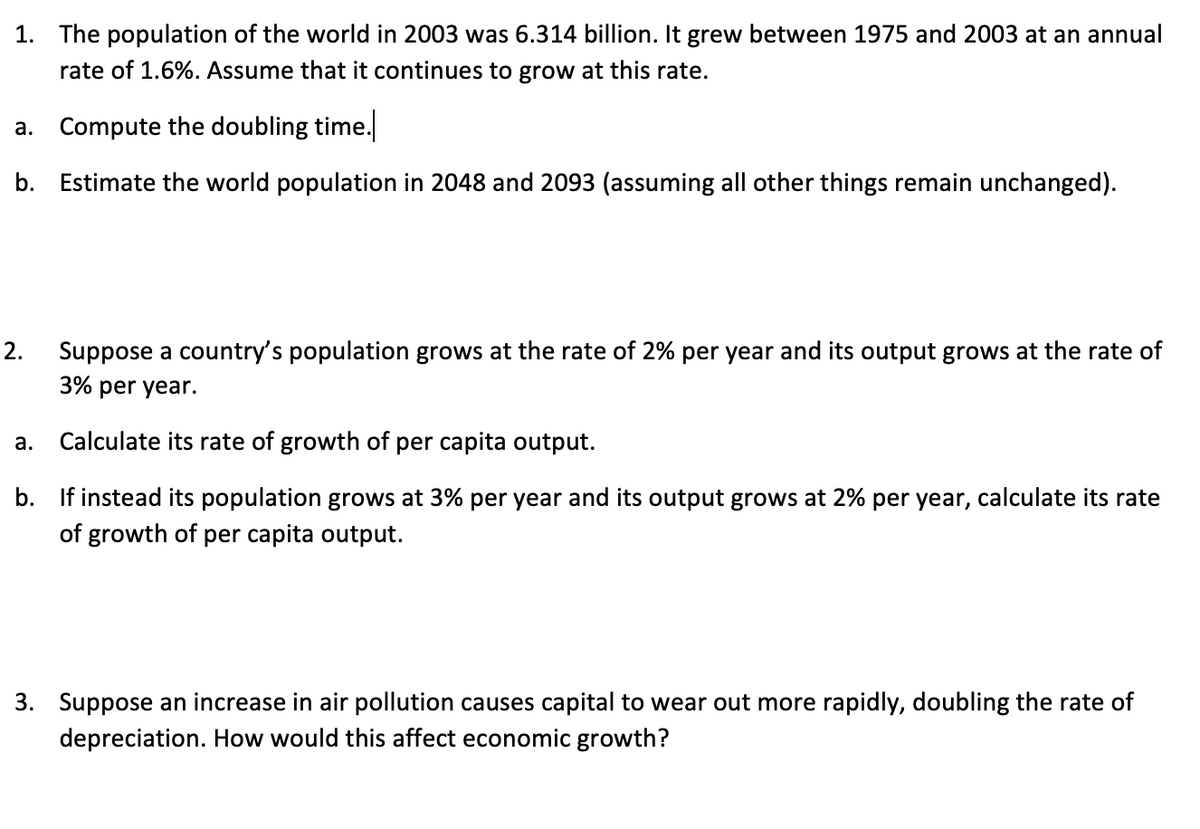1. The population of the world in 2003 was 6.314 billion. It grew between 1975 and 2003 at an annual rate of 1.6%. Assume that it continues to grow at this rate. a. Compute the doubling time. b. Estimate the world population in 2048 and 2093 (assuming all other things remain unchanged).
1. The population of the world in 2003 was 6.314 billion. It grew between 1975 and 2003 at an annual rate of 1.6%. Assume that it continues to grow at this rate. a. Compute the doubling time. b. Estimate the world population in 2048 and 2093 (assuming all other things remain unchanged).
Principles of Economics 2e
2nd Edition
ISBN:9781947172364
Author:Steven A. Greenlaw; David Shapiro
Publisher:Steven A. Greenlaw; David Shapiro
Chapter19: The Macroeconomic Perspective
Section: Chapter Questions
Problem 25CTQ: Cross country comparisons of GDP per capita typically use purchasing power parity equivalent...
Related questions
Question

Transcribed Image Text:1. The population of the world in 2003 was 6.314 billion. It grew between 1975 and 2003 at an annual
rate of 1.6%. Assume that it continues to grow at this rate.
Compute the doubling time.
а.
b. Estimate the world population in 2048 and 2093 (assuming all other things remain unchanged).
2.
Suppose a country's population grows at the rate of 2% per year and its output grows at the rate of
3% per year.
а.
Calculate its rate of growth of per capita output.
b. If instead its population grows at 3% per year and its output grows at 2% per year, calculate its rate
of growth of per capita output.
3. Suppose an increase in air pollution causes capital to wear out more rapidly, doubling the rate of
depreciation. How would this affect economic growth?
Expert Solution
This question has been solved!
Explore an expertly crafted, step-by-step solution for a thorough understanding of key concepts.
This is a popular solution!
Trending now
This is a popular solution!
Step by step
Solved in 3 steps

Knowledge Booster
Learn more about
Need a deep-dive on the concept behind this application? Look no further. Learn more about this topic, economics and related others by exploring similar questions and additional content below.Recommended textbooks for you

Principles of Economics 2e
Economics
ISBN:
9781947172364
Author:
Steven A. Greenlaw; David Shapiro
Publisher:
OpenStax


Managerial Economics: A Problem Solving Approach
Economics
ISBN:
9781337106665
Author:
Luke M. Froeb, Brian T. McCann, Michael R. Ward, Mike Shor
Publisher:
Cengage Learning

Principles of Economics 2e
Economics
ISBN:
9781947172364
Author:
Steven A. Greenlaw; David Shapiro
Publisher:
OpenStax


Managerial Economics: A Problem Solving Approach
Economics
ISBN:
9781337106665
Author:
Luke M. Froeb, Brian T. McCann, Michael R. Ward, Mike Shor
Publisher:
Cengage Learning